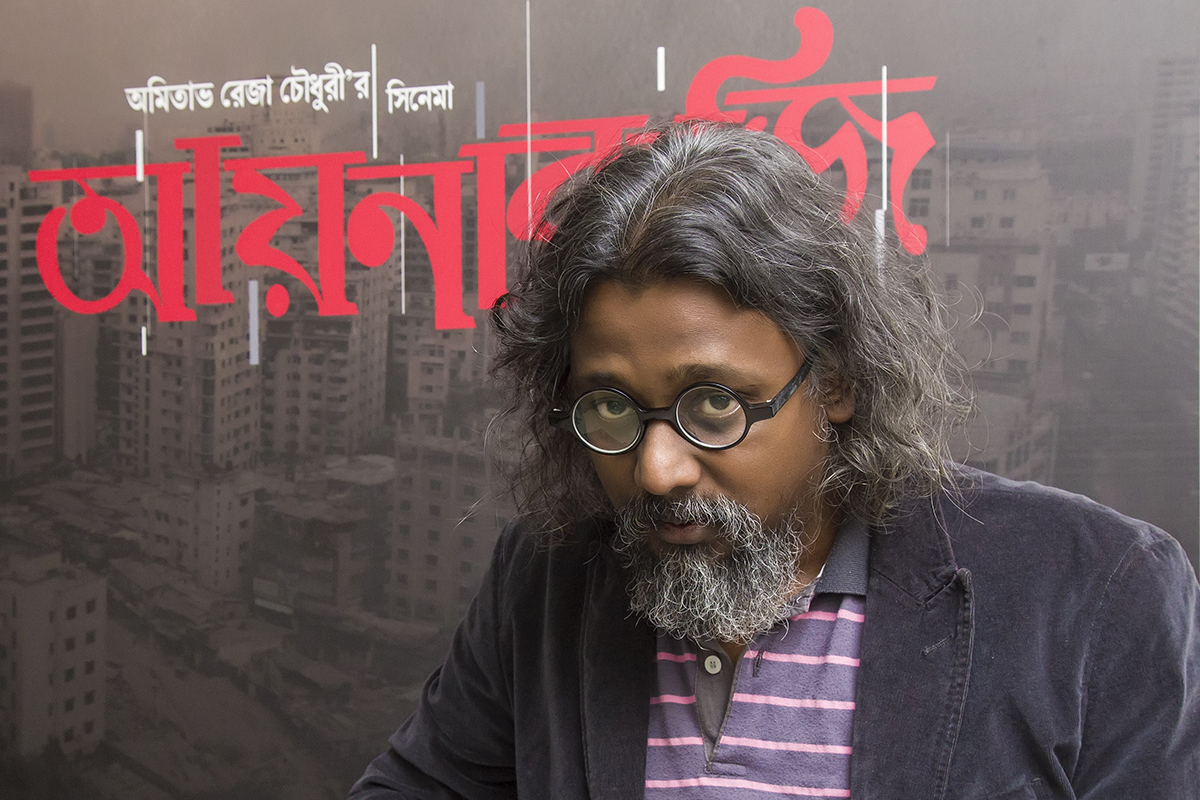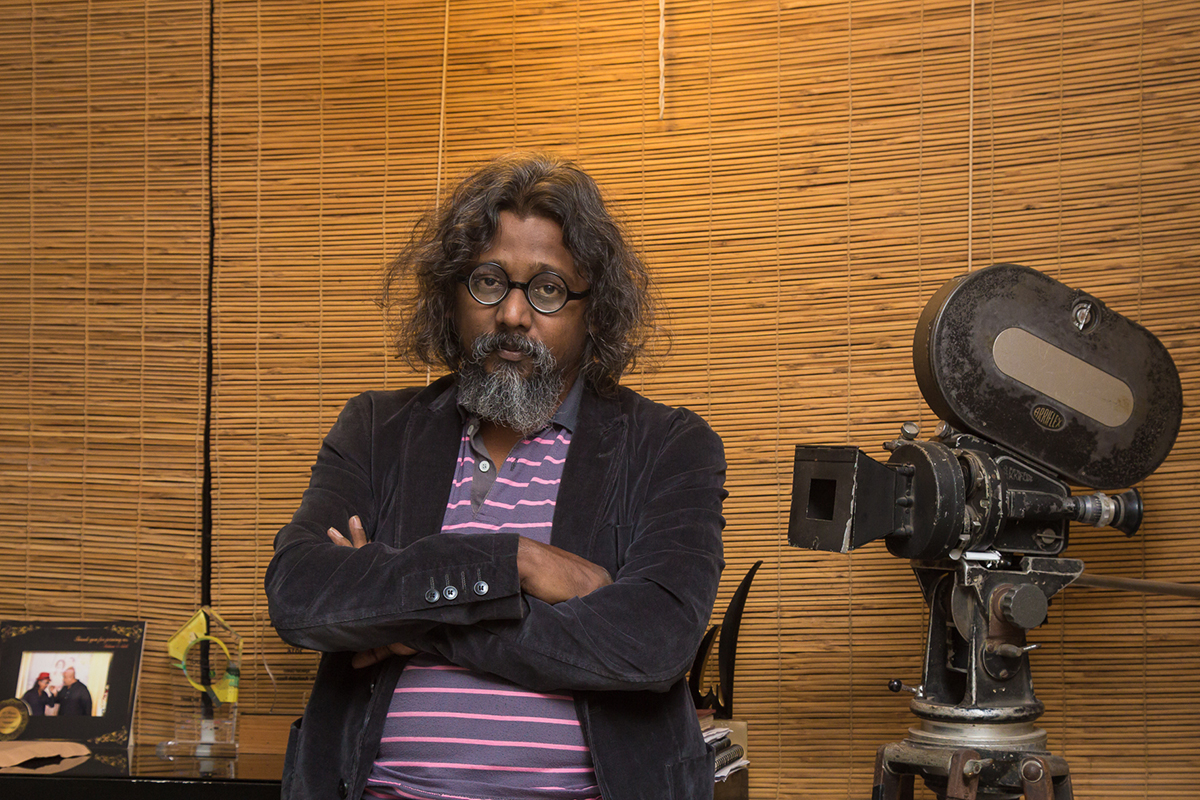Amitabh Reza: A new role for the director

Amitabh Reza, the man who brought into TVC a localised pattern of storytelling, thereby revolutionizing the genre, began to delve into ad making since the early years of the millennium. The owner of a protean mind that struck gold with myriad successful ad campaigns for Bangladesh’s top brands, always carried the seed of a filmmaker in him. Though his first film Ainabaji (2016) was not the kind he would continue to make, according to the maker himself.
‘This was my way of exercising the craft I have mastered over the years. The cinematic details that you encounter in it are the carryovers from my years of experience in ad making,’ says the young filmmaker, now ready to jump off the pad to begin what he describes ‘as a contented life of a filmmaker-teacher.’ He is now set to pursue both the vocations with seriousness, which began since couple of years ago.
Amitabh grew up responding to the world around him with what he himself describes as a middle class sensibility in which classlessness mattered. His stance always made him want to communicate to the multitude.
“I am part of the Bengali Muslim community that evolved in the 1980s Dhaka, and the family environ that I grew up in was soaked in the left-oriented ideology. Such current was predominant since comrade Ayub Reza Chowdhury was my uncle,” he claims.
“I thought it was a necessity that I spoke about the society where inequality was rife,” he says recalling his early conviction.
Amitabh’s fascination for his uncle was boundless. “I grew up when Soviet Union was on the verge of collapse and communism was on the wan around the world. The left ideology taught me to look at the society and culture from a definite perspective,” he testifies.
He feels that Marx is as relevant as before. On the question of how influences of Marxism, or left-politics for that matter, percolated into cultural codes when in the corporate arena capital dictates the products that are being made, he says the failure of the left-politician is related to their inability to interpret Marx in a modern, scientific way. They failed to bring into view new politics beyond left and right.”

Breaking the mold
“I always felt that I had things to speak about – so film is the medium I thought was best suited to my intentions,” he observes.
“I tried my hand in writing stories, poems even. And I could never master the art of drawing, so at one point in my early life I felt that film was my métier. When I used to go to see movies, I could realize that I enjoyed the form and I thought this was what I would try. Once I began making films, I fell in love with the medium – with the light, the sound and everything it entails, I simply started believing in it.”
What happened next is history – stories of success fit to be accommodated in the annals of advertising in this part of the world.
At the turn of the century, Amitabh started contemplating ways to take up film making as a profession. The outcome was One Stop Down, a platform that he launched in 2001. Under his guidance, the creatively inclined team of this new engine would soon become responsible for hundreds of TVCs or advertising films that caught the public imagination for their storylines as well as imageries.
“I took ad making as a profession so that at least I could begin to practice the craft,” Amitabh says.
One who was always on the lookout for chances to combine image with storytelling to thread them as in a movie, Amitabh’s hands-on experience began before he even floated his own enterprise.
His emergence concurs with the beginning of a new trend, when the TV stations began to acquire ‘outsourced products’, popularly known as ‘package dramas’, 2001 onwards.
“What is referred to as package drama is actually TV fiction, and we started working for ETV to meet some of their demands for such outsourced products. Right after that, Ranjan Rabbani and I together floated the venture called Half Stop Down and began to make advertising films,” says the ace filmmaker.
“Two of the most important persons joined the team – Mahzabin Reza, my producer, and Assaduzzaman. With these two on board, the company was given a proper structure,” he adds.
After this, commercial film kept him on his toes. In an interview with a national daily, he once lamented that years of ad making drained him off some his creative juice. By way of an explanation Amitabh now says, “There is this middle class push and pull at work – that to live with dignity you need to have a regular and adequate income.
When you have established a company, it comes with liabilities – including that of the people who work for you. And when you are at it you have do a lot of work sometimes. Another reason for the frustration is that when you work with a lot of different clients, there are occasions when clients’ taste does not match with mine.”
The advertising world has its moments of triumph and disappointment. Amitabh, an adroit ad maker of our time, sometimes enjoyed being proactive in making a client develop an understanding of what he has just pitched.
Still there are occasions when compromise was the only way out. “When someone tells me to paint a wall blue, I may react and say this would look ugly. But, sometimes that is exactly what you have to do to be a professional,” he says.
Satyajit Roy, the auteur filmmaker of the previous century, who also began his career with advertising, once wrote in his memoir that ‘advertising artist was never free, but had to conform to the whims of clients who held the purse string.’ However, in the molecular realm of commercial filmmaking Amitabh always kept envisioning an improved DNA, to put it figuratively. As such, he never lost sight of his dream.
Behind every success story, there are struggles. And Amitabh’s rise too had been made possible through initial staggers and bold steps which catapulted him to the limelight.
“The first film cost me a little more than one lakh taka, though was budgeted exactly at one lakh taka. My father came to my rescue. I never had my mind set on what people referred to as profit maximization, I always thought after accepting a remuneration, the rest of the money can easily be spent on the next film,” he adds.
Amitabh has his own way of making work part of his life. “My seriousness often rubs off on my professional project when I am set out to represent a company or a product. When I was making ads for Dejuice, I started using their sim. When I was working on Meryl soap, I started using it,” he says.
“I would have to believe that the Pure Flower is also tastier than other flower brands. I would have to feel it that this is really the case,” he adds, stressing the fact that without having felt the truth by experiencing it, Amitabh usually could never really set out to promoting that product.
However, there are exceptions. And there was no likelihood of existential horror related to his failure to like a particular product and then having to work for its producer. “When I could not say no to a project, I just approached it professionally,” he clarifies.
Around 18 years have elapsed after finally in 2016, Amitabh could manage to free himself from all the entanglements to embark on his first film. Ainabaji, though took the counry by storm, and became the talk of the town, cost its maker dearly.
“Ainabaji was a dark phase in my life. There were fallouts from which we are still struggling to recover. It made some profit, but much of it cannot be recovered because of the way the distribution system works here in Bangladesh,” he says, adding that, “The loss I incurred is due to the fact that my team here in One Stop Down was engaged in the film and all other professional engagements came to a halt.”
This is not just pure banter about working on a profit-making movie, while remaining penniless afterwards. Half Stop Down has been reduced drastically, they are now down to only a single-floor office, “which once operated from three floors right before Ainabaji.”
Though Amitabh is now ready to say goodbye to the advertising world, the time he spent in it did not go in vain.
“If I did not have a team, which I now have, perhaps I would not have developed the craft my first film has been structured with. Ainabaji’s craft has been developed during my time spent in advertising. Its significance as a film may not be something I would count on. But the fact is, it uses the basic craft of film – the lights, the visual presentations, etc. – in a manner for which I am beholden to my advertising career,” he adds.
A man with a degree in Economics from Pune, India, Amitabh has now reached a stage to explore whatever his heart leads him to! “I made three short films, and they seem so facile now because in the last 18 years I have already worked on one and half thousands advertising. I know for sure now what position to take, to determine the best possible angle to shoot a scene. This is the result of rigorous practice. What has not been fully explored is the exercise in ‘thinking’,” he continues.
Amitabh feels that he has overstayed in the industry!
“Usually people stay in advertising for eight to ten years before moving onto other areas of interest,” says the man who still have some steam left for advertising. The reward was an obvious one.
“The quality that we have been able to achieve was due to our prolonged engagement,” argues Amitabh.
A man responsible for many out of the box ideas for TVCs has his own way of working his way through a project. Amitabh says that the advantage he had was because he always read a lot before embarking on a project as part of preparation. “I teach film at Dhaka University, and the kind of preparation that goes behind each class is important to me,” he adds.

Back to the future
Satayajit once talked about moving from minor to a major key, to describe his willingness to graduate from advertising to filmmaking. Similar modulation is to be found in Amitabh Reza’s off hand way of rejecting Aainabaji as not being philosophically closer to his heart.
“The last story I have written was ‘Bondhu athoba Bonduker Galpo,’ based on the Naxalite politics and my friends and acquaintances are all unanimously calling it my first film, which is available on iflix,” says Amitabh whose next commercial venture, another feature film, would be the first international production entitled Rickshaw Girl.
“I met Eric J. Adams, an Indie film producer from the US, at a friend’s residence. He was intent on turning Indian-America author Mitali Perkins’ book Rickshaw Girl into a movie. He was searching for the right person to direct this film and his research told him that I would be that director,” says Amitabh.
Since then, the producer has been hounding the director to finalize the script, which has been revised many times till date. “It would be an English movie and would be distributed in North America,” says Amitabh.
Though many accolades have accumulated for his excellence in what he does, one who now rule the roost in advertising and filmmaking, Amitabh remains an incorrigible utopian at heart. “The dream job of my later life would be ‘agriculture’ – that is the finest form of art,” he concludes.




